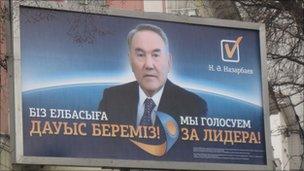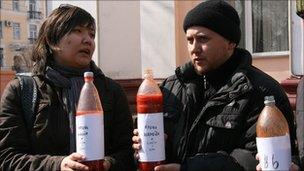Kazakhstan: President Nazarbayev awaits re-election
- Published
The BBC's Rayhan Demytrie went to visit a museum dedicated to President Nazarbayev
"Vote for Yelbasi, come to the election," shout students distributing leaflets in a park in Almaty, Kazakhstan's largest city.
They are members of the pro-presidential youth movement Zhas Otan and are dressed in white T-shirts, baseball caps and blue vests emblazoned with the words "Nazarbayev is our leader".
"Yelbasi" in Kazakh means the "leader of the nation". It is the official title of President Nursultan Nazarbayev, who has ruled the oil-rich nation for more than 20 years and is running for the job once again.
"We want people to vote for our leader. Because of him the whole world knows about Kazakhstan. The youth of our country supports the president and we believe in his policies," says Duman Juniskhan, one of the young activists.
Duman and many others in Kazakhstan know that Mr Nazarbayev is almost certain to win Sunday's vote. His rivals in the contest are three low-profile politicians who oppose the president only on paper.
The country's main opposition parties are boycotting the election and calling on their supporters to do the same.
One of the reasons for their decision is the lack of time they were given to prepare for the presidential race.
'Nation's interests'
The president caught them off guard in February with his unexpected call for a snap election.

President Nazarbayev has ruled Kazakhstan for more than two decades
It followed weeks of debate in the country's one-party parliament over whether to hold a referendum on extending Mr Nazarbayev's rule until 2020.
The president rejected the proposal, telling his government in late January: "I suggest we look at this decision as a historical lesson in democracy.
"As the first democratically elected president and, guided by the interests of the nation, I decided not to hold a referendum. Instead I am proposing to hold a snap election despite the fact that it will shorten my current term by almost by two years."
But there is little in the way of democracy about the forthcoming vote; with no real competition the outcome is clear.
Political analyst Dosym Satpayev says the process is a farce.
"Everybody knows who will win but they still call it an election. A (democratic) election means having a choice of candidates with equal opportunities. There is no genuine choice of candidates so a more suitable name for it would be political theatre - a one-man show."
'Kitchen democracy'
The calls for a referendum began late last year, with five million signatures collected in support of the idea.
The debate on the referendum coincided with the revolution in Tunisia, where the president of 23 years was ousted in a popular uprising.
The decision in Kazakhstan to abide by the constitution and hold elections came at the height of a revolution in Egypt, and the end of the authoritarian system there.
So was the government's decision influenced by those events and how likely is such a scenario here in Kazakhstan?
"One of the triggers for the events in North Africa was extreme hikes in the price of food and other goods. We have not seen similar developments here in Kazakhstan," says Mia Olsson from Lund University in Sweden, an expert in Kazakh politics.
"Kazakhstan lacks the kind of middle class that you had both in Tunisia and Egypt. Here there is a very large, very wealthy group of people. But the ordinary school teachers, doctors and nurses cannot be categorised as middle class simply because they do not earn enough."
Political analyst Dosym Satpayev adds that Kazakh people are just not accustomed to protesting.
"What we have here is a Soviet form of protest, so-called 'kitchen democracy'# - when people get together in their kitchens they criticise the government, but when they go to work the next day they behave like everybody else."
A recent anti-government rally organised by opposition parties is a case in point. Despite rare permission from the authorities to hold the protest, just a small crowd, mainly pensioners, turned up.
Another group of protesters made up of dozens of people in heavy debt went to meet Mr Nazarbayev in the capital, Astana, only to be brutally dispersed by the police and forced to leave the city.
The protest organiser, Esinbek Ukteshbayev, was jailed for 15 days.
In a show of support, opposition youth activists spilled what they called the "blood and tears" of the Kazakh people on the stairs of the presidential party headquarters in Almaty.

The "blood and tears" protest in Almaty was a rare display of discontent by the youth
"We are here to protest against what happened in Astana. Why can't people meet and raise their concerns with the presidential candidate? We are also supporting the 'no vote' campaign because this election is without choice," said activist Janna Baytelova.
The "blood" was just tomato juice but such displays of discontent by youth are rare.
"The majority of Kazakh youth are not interested in this election because there is no competition and most of the candidates can't even speak decent Kazakh," says Aidos Sarym, the founder of several popular Kazakh language internet forums.
YouTube and Facebook have been used as campaign tools by opposition activists calling for people to boycott the vote.
However, internet sites have failed to draw a large following. Short anti-government videos on YouTube have had no more than several hundred views and a specifically designed Facebook page has fewer than 500 followers.
Back in the park in Almaty, 87-year-old WWII veteran Baisenov Turat is watching the students distributing their election leaflets.
"We need change. Young people should come to power, they will bring their own ideas and this is when we will be able to move forward.
"I remember in Soviet times Nazarbayev criticised the former Communist Party chief for staying in power for too long. He used to say that a person can get tired and make mistakes. He must have forgotten those words," says Mr Turat, smiling.
- Published4 February 2011
- Published7 January 2011
- Published14 January 2011
- Published29 December 2010